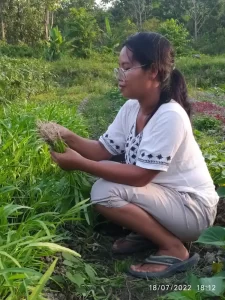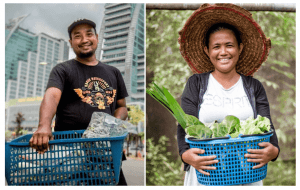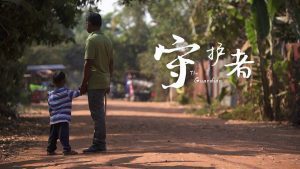Period poverty refers to women and girls not having adequate access to education about menstruation and sanitary pads, clean water, pain medications, and sanitary products during their period (menstrual cycle).
Despite the lack of appropriate data on period poverty in Malaysia to identify the extent of period poverty, the issue is prevalent among rural dwellers.
There are 46 women living in Melai, while there are approximately 150 women living in Ulu Gumum. In order to have a better understanding of period poverty, we talked with three women from both villages about their experiences and challenges in managing their monthly cycles.
Mothers Are Primary Period Educators
When Haniz, 34, from Melai, started menstruating, she turned to her mother for help.
When I first got my period, I confided in my mother who taught me how to use a cloth to make a sanitary pad. She also advised me to shower and change my sanitary pad when the blood flow was heavy. – Haniz, 34
Similarly, Zira, 25, from Ulu Gumum, sought her mother’s advice on how to dispose of used sanitary pads.
When I was a teenager, my mother taught me to wash the pads that had been used until they were clean and bury them. – Zira, 25

In Melai, Maimun, a 46-year-old mother ensures that her daughters receive the necessary support and advice about their feminine health. In addition, the current generation of Orang Asli (OA) girls have benefited from relevant education on puberty in school.
I taught my daughters about periods when they experienced menstruation, and they also learned about it in school. – Maimun, 46
‘Eco-Pads’ Were A Thing Before It Became Mainstream
Haniz, Zira and Maimun are grateful that a shop is close to their villages where they are able to purchase sanitary pads.
In Melai, the nearest store is 2.6km away, a 10-15 minute walk from their village. Similarly, in Ulu Gumum, Zira can purchase pads from a nearby store.

But women and girls living in more remote villages may struggle to do so.
Not all rural communities have been blessed with a nearby shop that supplies sanitary pads. Some communities may have to travel out of their villages to purchase them in town.
Women who have difficulty getting a supply of pads may be from a village far from the nearest store, so it’s hard to buy. – Zira, 25
The ladies would spend between RM5-10 per month on sanitary pads alone.
As for me, I buy and keep the pads in stock, and it is not difficult to buy them. – Zira, 25
The women of Melai, however, prefer to use washable sanitary pads. In addition to being more affordable, it is kinder to the environment, as there is less waste to dispose of.
Usually, women in Melai prefer to wear reusable pads such as white cloth, because it is more comfortable, easy to absorb, easy to wash, and can be reused. I bought 10 pieces for RM4.50 each, so, in total RM45. But I did not buy them every month because this type is washable. – Haniz, 34
In communities, where sanitary pads may not be easily accessible, rural women and girls in different communities have used non-absorbent materials such as coconut husks and banana leaves. The use of alternative materials, however, may expose women and girls to infection and health risks.
Natural Remedies As Pain Relievers
Synonymous with menstruation is the ensuing period pain that sometimes could debilitate the ability of women and girls to work or continue with their daily routine. As the Melai and Ulu Gumum villages have convenience stores nearby, Zira and Maimun rely on over-the-counter medications such as Panadol.
I usually take medicine to cope with period pain. I bought it from the pharmacy.– Zira, 25

Haniz, on the other hand, has a herbal concoction ready for her time of the month.
If I want to get rid of menstrual pain, I will drink herbal water from the roots of trees that the elderly find in the forest. The beverage is made up of akar midu, akar kajut and akar rempah gunung. I’ll take it 2-3 times during my period. – Haniz, 34
Maintaining Good Sanitation And Hygiene
There are pockets of rural communities missing out on basic amenities such as toilets and access to running water. Without proper toilets and running water, it exposes menstruating women to infection risks and also compromises their dignity.
Thankfully in Melai and Ulu Gumum, the homes of Maimun, Haniz and Zira are equipped with toilets and a clean water supply is available.

My house has a toilet and a clean water source from the Jabatan Bekalan Air. – Zira, 25
Previously in Melai, the community relied on water sources from the hill and in the dry season, the water won’t reach their homes. However, the situation has improved in recent years.
Our clean water now comes from solar tubewell and gravity water.– Haniz, 34
Eliminating Period Poverty Once And For All
Zira sometimes experiences period pain that would lead to her miss work because of it. But, she would have the necessary medication to ease the pain. This, however, isn’t the reality of other rural women and girls in Malaysia.
Data shows that 1 in 2 girls in Malaysia would want to skip school during their menstrual cycle. In rural areas, girls are often absent from school affecting their academic achievements.
It is heartening to see that the women in Melai and Ulu Gumum are empowered to educate their younger generation on a topic still considered taboo in many communities. With louder voices of women such as Haniz, Zira and Maimun, women in Melai and Ulu Gumum are in safe hands when it comes to speaking up on women’s issues.
The availability of affordable sanitary pads, toilets and water contributed by different parties adds to the effort of tackling period poverty.
Taking Melai and Ulu Gumum as examples, it shows that if we work together, period poverty will cease to exist in other OA and rural communities. Solving period poverty in more rural communities is a start that could allow more OA girls to be part of quality education and better employment opportunities in the future.
SOURCES:
- Kwan, F. (2020). The Painful Reality of Period Poverty in Malaysia. Free Malaysia Today. Link
- Kotex. (2022). 1 In 2 Girls Report Wanting To Skip School When Menstruating. Link


